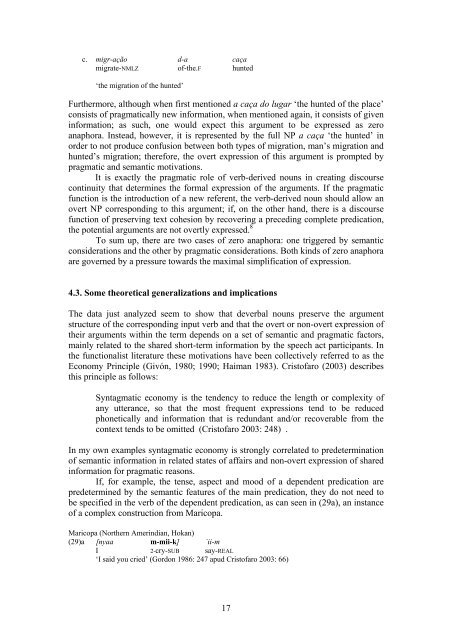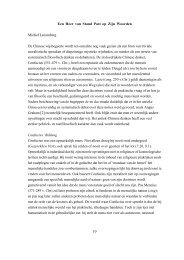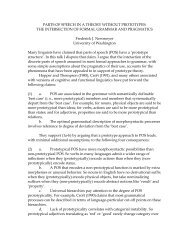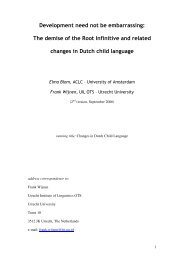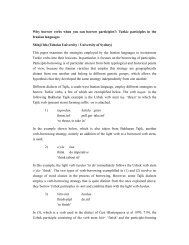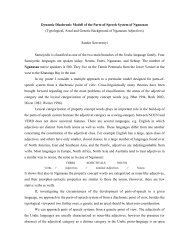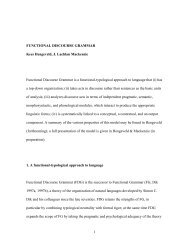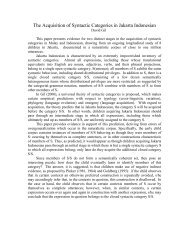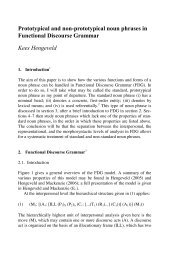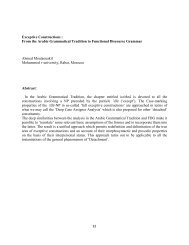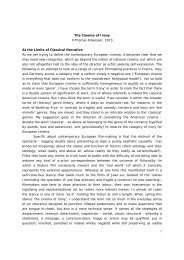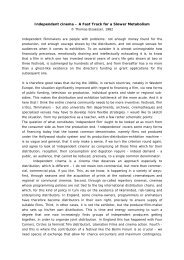The argument structure of deverbal nouns in Brazilian Portuguese
The argument structure of deverbal nouns in Brazilian Portuguese
The argument structure of deverbal nouns in Brazilian Portuguese
You also want an ePaper? Increase the reach of your titles
YUMPU automatically turns print PDFs into web optimized ePapers that Google loves.
c. migr-ação d-a caça<br />
migrate-NMLZ <strong>of</strong>-the.F hunted<br />
‘the migration <strong>of</strong> the hunted’<br />
Furthermore, although when first mentioned a caça do lugar ‘the hunted <strong>of</strong> the place’<br />
consists <strong>of</strong> pragmatically new <strong>in</strong>formation, when mentioned aga<strong>in</strong>, it consists <strong>of</strong> given<br />
<strong>in</strong>formation; as such, one would expect this <strong>argument</strong> to be expressed as zero<br />
anaphora. Instead, however, it is represented by the full NP a caça ‘the hunted’ <strong>in</strong><br />
order to not produce confusion between both types <strong>of</strong> migration, man’s migration and<br />
hunted’s migration; therefore, the overt expression <strong>of</strong> this <strong>argument</strong> is prompted by<br />
pragmatic and semantic motivations.<br />
It is exactly the pragmatic role <strong>of</strong> verb-derived <strong>nouns</strong> <strong>in</strong> creat<strong>in</strong>g discourse<br />
cont<strong>in</strong>uity that determ<strong>in</strong>es the formal expression <strong>of</strong> the <strong>argument</strong>s. If the pragmatic<br />
function is the <strong>in</strong>troduction <strong>of</strong> a new referent, the verb-derived noun should allow an<br />
overt NP correspond<strong>in</strong>g to this <strong>argument</strong>; if, on the other hand, there is a discourse<br />
function <strong>of</strong> preserv<strong>in</strong>g text cohesion by recover<strong>in</strong>g a preced<strong>in</strong>g complete predication,<br />
the potential <strong>argument</strong>s are not overtly expressed. 8<br />
To sum up, there are two cases <strong>of</strong> zero anaphora: one triggered by semantic<br />
considerations and the other by pragmatic considerations. Both k<strong>in</strong>ds <strong>of</strong> zero anaphora<br />
are governed by a pressure towards the maximal simplification <strong>of</strong> expression.<br />
4.3. Some theoretical generalizations and implications<br />
<strong>The</strong> data just analyzed seem to show that <strong>deverbal</strong> <strong>nouns</strong> preserve the <strong>argument</strong><br />
<strong>structure</strong> <strong>of</strong> the correspond<strong>in</strong>g <strong>in</strong>put verb and that the overt or non-overt expression <strong>of</strong><br />
their <strong>argument</strong>s with<strong>in</strong> the term depends on a set <strong>of</strong> semantic and pragmatic factors,<br />
ma<strong>in</strong>ly related to the shared short-term <strong>in</strong>formation by the speech act participants. In<br />
the functionalist literature these motivations have been collectively referred to as the<br />
Economy Pr<strong>in</strong>ciple (Givón, 1980; 1990; Haiman 1983). Crist<strong>of</strong>aro (2003) describes<br />
this pr<strong>in</strong>ciple as follows:<br />
Syntagmatic economy is the tendency to reduce the length or complexity <strong>of</strong><br />
any utterance, so that the most frequent expressions tend to be reduced<br />
phonetically and <strong>in</strong>formation that is redundant and/or recoverable from the<br />
context tends to be omitted (Crist<strong>of</strong>aro 2003: 248) .<br />
In my own examples syntagmatic economy is strongly correlated to predeterm<strong>in</strong>ation<br />
<strong>of</strong> semantic <strong>in</strong>formation <strong>in</strong> related states <strong>of</strong> affairs and non-overt expression <strong>of</strong> shared<br />
<strong>in</strong>formation for pragmatic reasons.<br />
If, for example, the tense, aspect and mood <strong>of</strong> a dependent predication are<br />
predeterm<strong>in</strong>ed by the semantic features <strong>of</strong> the ma<strong>in</strong> predication, they do not need to<br />
be specified <strong>in</strong> the verb <strong>of</strong> the dependent predication, as can seen <strong>in</strong> (29a), an <strong>in</strong>stance<br />
<strong>of</strong> a complex construction from Maricopa.<br />
Maricopa (Northern Amer<strong>in</strong>dian, Hokan)<br />
(29)a [nyaa m-mii-k] ´ii-m<br />
I 2-cry-SUB say-REAL<br />
‘I said you cried’ (Gordon 1986: 247 apud Crist<strong>of</strong>aro 2003: 66)<br />
17


